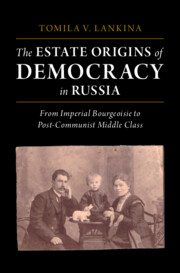Book contents
- Reviews
- The Estate Origins of Democracy in Russia
- The Estate Origins of Democracy in Russia
- Copyright page
- Dedication
- Contents
- Figures
- Tables
- Preface
- Notes on Transliteration
- Abbreviations
- Dramatis Personae
- 1 Theorizing Post-Revolutionary Social Resilience
- 2 From Imperial Estates to Estatist Society
- 3 Mapping Society and the Public Sphere in Imperial Russia
- 4 The Professions in the Making of Estatist Society
- 5 Education, Socialization, and Social Structure
- 6 Market Values and the Economy of Survival
- 7 Family Matters: Looking Back – and Forward – in Time
- 8 Society in Space
- 9 The Two-Pronged Middle Class: Implications for Democracy across Time and in Space
- 10 The Bourgeoisie in Communist States: Comparative Insights
- Afterword
- Supplementary Appendices
- Bibliography
- Index
5 - Education, Socialization, and Social Structure
Published online by Cambridge University Press: 02 December 2021
- Reviews
- The Estate Origins of Democracy in Russia
- The Estate Origins of Democracy in Russia
- Copyright page
- Dedication
- Contents
- Figures
- Tables
- Preface
- Notes on Transliteration
- Abbreviations
- Dramatis Personae
- 1 Theorizing Post-Revolutionary Social Resilience
- 2 From Imperial Estates to Estatist Society
- 3 Mapping Society and the Public Sphere in Imperial Russia
- 4 The Professions in the Making of Estatist Society
- 5 Education, Socialization, and Social Structure
- 6 Market Values and the Economy of Survival
- 7 Family Matters: Looking Back – and Forward – in Time
- 8 Society in Space
- 9 The Two-Pronged Middle Class: Implications for Democracy across Time and in Space
- 10 The Bourgeoisie in Communist States: Comparative Insights
- Afterword
- Supplementary Appendices
- Bibliography
- Index
Summary
In this chapter I extend insights about the channels of professional continuity discerned in Chapter 4 to focus on the institutions that socialized the next generation of Soviet citizens. I first present Russia-wide data on resilience in education as related to the estates and follow this data analysis with a qualitative account of imperial schooling. Statistical analysis is strongly suggestive of the interconnected human-capital and estate drivers of spatial variations in educational attainment and institutions during the communist period and in the present. To unpack the causal mechanisms behind the statistical patterns, I adapted concepts of institutional drift and conversion to Russia’s post-revolutionary context. Insights from comparative historical analysis into institutional path-dependencies help dissect how the eclectic tapestry of schools catering to Samara’s educated society found its phoenix-like reincarnation in Soviet pedagogy, even when punctuated with closures and reforms. An exercise in historical forensics concerning the Samara Jewish School allows me to dissect some ways in which lower-status pedagogic old-timers capitalized on their new status as Soviet school headmasters. Finally, similar to patterns observed in Samara City, I dissect heterogeneity in demand for and supply of schooling within rural areas.
- Type
- Chapter
- Information
- The Estate Origins of Democracy in RussiaFrom Imperial Bourgeoisie to Post-Communist Middle Class, pp. 161 - 199Publisher: Cambridge University PressPrint publication year: 2021



